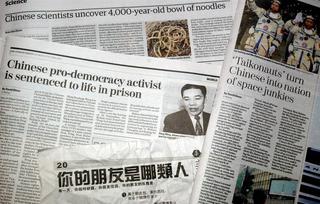
China has been in the news this week with a number of developments which will no doubt ruffle western business interests. First came an announcement that China was set to launch HD DVD [Hi-Definition Digital Versatile Disc] to rival Sony’s Blu-Ray DVD technology. China's next-generation DVD is based on, but not compatible with, today's HD-DVD format. But a statement on Xinhua News seemed to clarify the reasoning behind such developments, “China produced about 70 percent to 80 percent of the world's DVD players. However, Chinese manufacturers need to pay licensing fees to overseas patent holders in the DVD industry. The licensing fee accounts for 40 percent of the rough cost of each DVD player.” The format is likely to hit the streets in 2008.
China’s space program was given a boost with an announcement of another manned launch. “China's successful launch of its second manned spacecraft Shenzhou-6 on Oct. 12 has drawn worldwide applause in recognition of the technological advances to become the world's third nation capable of putting a man into space,” said Xinhua News. The worldwide applause may not have been in evidence, as suggested by China’s state press agency, but there is a quiet realization of China’s increased abilities amongst western nations. This was China’s second manned mission into space and a fanfare surrounded this launch with state television showing live broadcast of the launch and pictures beamed from space. The intimate view differs dramatically from two years ago, when no pictures of the first Chinese manned venture was shown on live TV, apparently over fears something would go wrong. [CNN]
Meanwhile at the G20, President Hu Jintao has made a keynote speech at the Seventh G20 Finance Ministers and Central Bank Governors Meeting, which opened Saturday [15th October] in Beijing [Xinhua News Agency]. In it he said the world was “faced with both opportunities and challenges”. He added that China “must strengthen international cooperation to seize opportunities and meet challenges together so as to promote balanced and orderly development of the world economy.” But China’s slow moves towards democracy are still being criticized, even if not highlighted during the G20 forum. The BBC reported on further unrest in Taishi, in Guangdong province, which has thrown fresh doubts of China’s claim to introduce democracy “from the bottom up.” Direct elections of local officials by almost a million villages across the country have in recent years been widely welcomed as a possible first step towards a multi-party state. But there is criticism that China’s move towards democracy is not moving fast enough and that the government is no more serious about grassroots democracy than any other sort of political reform. But with increased co-operation with the West, there has been much investment in China by western brands. Coca-Cola, Ikea and Starbucks are just some of the western brands seen regularly around Beijing. But a bid by BP this week for a stake in China’s oil industry was firmly rejected. The world's second-largest oil company by market capitalisation offered to swap interests in oil or gas fields in return for a big chunk of Sinopec, as China Petroleum & Chemical Corporation is better known, sources told Reuters. "BP has misread what the Chinese want ... They (the Chinese) said 'no'. They've said they're not doing it," one source said.
Wargames held in the last month have brought fears to some countries which see the exercises as a prelude to hostile action against disputed territories. Taiwan, Korea and Japan have all expressed their dissatisfaction over the exercises which were a joint operation between Russia and China. Fox News reported, “The two would-be superpowers held unprecedented joint military exercises Aug. 18-25. Soothingly named “Peace Mission 2005,” the drills took place on the Shandong peninsula on the Yellow Sea, and included nearly 10,000 troops. Russian long-range bombers, the army, navy, air force, marine, airborne and logistics units from both countries were also involved.” Both Moscow and Beijing claimed the maneuvers were aimed at combating terrorism, extremism and separatism (the last a veiled reference to Taiwan), but, said Fox, “It’s clear they were an attempt to counter-balance American military might.”
This week also saw the opening of a new railway in Tibet. China announced on Saturday completion of the world's highest railway, the Qinghai-Tibet Railway, which stretches 1,956 kilometers from Xining to Lhasa cities in western China. Construction of the 1,142-km-long Golmud-Lhasa section of the railway, which runs across the Kunlun and Tanggula mountain ranges, started in June 2001 and has cost 24 billion yuan (3 billion US dollars) to build thus far, Xinhua News reported. Sources from the Ministry of Railway say after the test runs next year, the railway will link Lhasa with five major Chinese cities -- Beijing, Shanghai, Xining, Chengdu and Guangzhou. It will also carry 75 percent of all the inbound cargoes into Tibet, cutting transportation costs and boosting local economy. The railway is at least 200 metres higher than the Peruvian railway in the Andes, reaching 5,072 metres above sea level at some points along its route.
And finally, scientists have discovered the world’s oldest noodles at an archaeological site in Lajia, north-west China. The millet noodles are said to be 4,000 years old, predating earlier discoveries by more than 2,000 years [USA Today].
[15:15 GMT 15/10/2005]

No comments:
Post a Comment